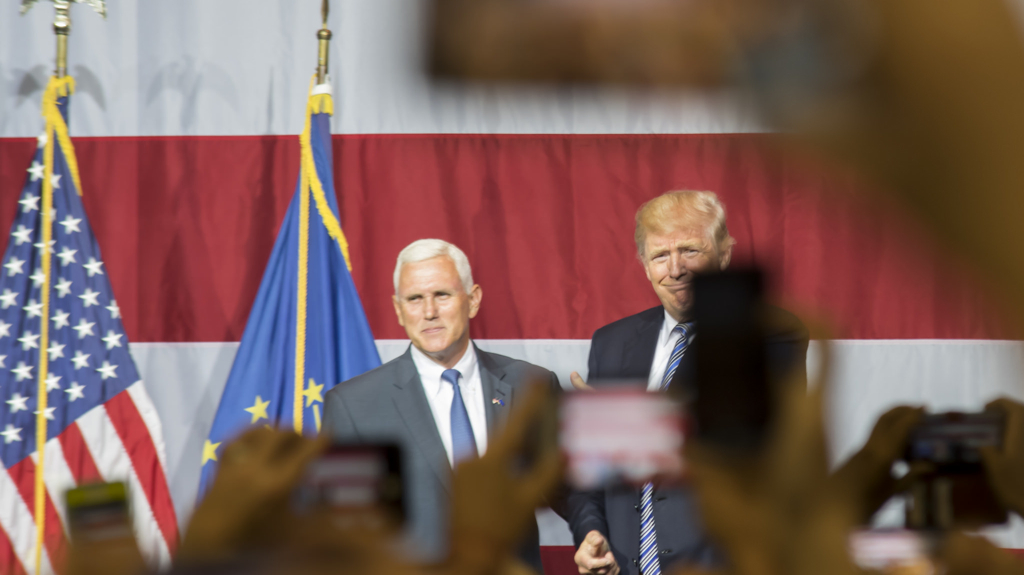On July 1 Weekly Standard Editor Bill Kristol tweeted that he has been told that Donald Trump will choose either Indiana Governor Mike Pence or retired Army Lieutenant General Michael Flynn as his running mate. This latest prediction by Kristol, who has been far from accurate in his predictions about the Republican Party’s presumptive presidential nominee, is not rooted in any assessment of Pence’s or Flynn’s experiences, temperaments, or policy positions, but in the brevity of their last names.
I’m told Trump’s VP will be @GovPenceIN or @GenFlynn. One among several reasons: Trump is convinced one-syllable last names convey strength.
— Bill Kristol (@BillKristol) July 2, 2016
There’s a sliver of logic in this: on Wednesday, Senator Bob Corker of Tennessee recused himself from becoming Trump’s second banana, and it was reported Thursday that New Jersey Governor Chris Christie is only being vetted as a “courtesy.” If Trump indeed holds this belief about one-syllable surnames, Pence or Flynn became even more likely selections when Senator Joni Ernst of Iowa bowed out.
The biggest thing running counter to the one-syllable-name rule, though, is Trump’s growing romance with former House Speaker Newt Gingrich. The two were chummy at a rally Wednesday in Cincinnati, and they even collaborated on a tweet in which Trump defended his now-infamous Star of David tweet with a coloring book tied into Frozen, a popular children’s movie.
Still, Trump has other one-syllable options if it isn’t Pence or Flynn. Florida Governor Rick Scott and Senator Richard Burr of North Carolina are both on a longer list of potential running mates compiled by the Atlantic. So is Ted Cruz, though that pairing seems unlikely. The most natural—and endorsed—one-syllable match for Donald Trump might be Ivanka Trump, who has been suggested by both Corker and her younger brother Eric Trump.
As with many of Trump’s pronouncements, there is no hard evidence that one-syllable last names connote strength. “I have never heard anything like that before,” says Michael McGoff, the senior vice provost of Binghamton University and the treasurer of the American Name Society.
But Donald Trump, if he really believes this, might want to be wary about the fact that in the 212 years since presidential and vice-presidential candidates have run on joint tickets, there are only six instances in which both candidates of a major party have had monosyllabic last names, and of those, four were losers. Here are the two-syllable presidential tickets, ranked by how they fared in the Electoral College:
1. Franklin Pierce-William R. King, Democratic, 1852
Pierce, a former senator from New Hampshire known to be sympathetic to southern states, chose Alabama’s William R. King as his running mate in a ploy to build a ticket that could win northern and southern votes. It worked: the Pierce-King ticket won 254 of 296 electoral votes that year, though the feelings of victory were short-lived. King contracted tuberculosis and died in April 1853, just weeks after their inauguration. Pierce, following a single term, supported the Confederacy in the Civil War and died, often drunk and hated by his New England neighbors for his rebel sympathies, in 1868.
2. George H.W. Bush-Dan Quayle, Republican, 1988
Bush, after two terms as Ronald Reagan’s vice president, chose Quayle, then a senator from Indiana, in part because of a reason even Donald Trump could get behind: his looks. Quayle’s appeal to 30- and 40-something Baby Boomers who had felt swept up in Reagan’s movement survived a vicious thrashing from his Democratic opponent, Lloyd Bentsen. Bush and Quayle crushed the Democratic ticket of crusty Massachusetts Governor Michael Dukakis and Bentsen by winning 40 states and 426 electoral votes.
3. Gerald Ford-Bob Dole, Republican, 1976
Ford ditched Vice President Nelson Rockefeller to run with Dole, then a senator from Kansas. They swept the Western states and enjoyed an optics bump when Ford got to preside over the nation’s bicentennial celebrations, but came up short when Jimmy Carter and Walter Mondale became the first Democratic ticket to sweep the South since 1960.
4. George H.W. Bush-Dan Quayle, Republican, 1992
The Baby Boomer wave Bush tried to ride in 1988 by picking Quayle crested four years later in the form of Bill Clinton and Al Gore. After crushing it in 1988, Bush and Quayle rang up just 168 electoral votes.
5. Bob Dole-Jack Kemp, Republican, 1996
Dole gained plenty of experience in the 20 years between his vice-presidential candidacy and his presidential nomination, but no syllables. And his experience losing with Ford didn’t help him avoid a monosyllabic running mate: He and Jack Kemp netted just 159 electoral votes.
6. Winfield Scott-William A. Graham, Whig, 1852
Scott, the hero of the Mexican-American War, might not have suffered one of the worst electoral drubbings in US history had gone with a longer-named Whig, like former President Millard Fillmore or Secretary of State Daniel Webster, instead of Graham, who served as a senator from North Carolina in the Union, the Confederacy, and then the Union again. Sad!



















